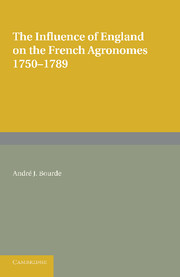Book contents
- Frontmatter
- Contents
- LIST OF ABBREVIATIONS
- Preface
- PART ONE THE PREPARATORY PERIOD 1700–50
- PART TWO DUHAMEL DU MONCEAU'S WORK
- PART THREE AGRARIAN REPERCUSSIONS OF THE NOUVEAU SYSTÉME
- PART FOUR HOW THE NEW HUSBANDRY WAS INTENDED TO ENRICH FRENCH AGRICULTURE
- Chapter VIII The New Crops
- Chapter IX The Problem of Livestock
- Chapter X Changes in Agricultural Implements
- Chapter XI Beginnings of Agricultural Chemistry
- PART FIVE SOME ASPECTS OF THE INTERNAL LIFE OF THE AGRONOMIC MOVEMENT
- Conclusion
- Appendix I
- Appendix II
- Bibliography
- Index
Chapter XI - Beginnings of Agricultural Chemistry
from PART FOUR - HOW THE NEW HUSBANDRY WAS INTENDED TO ENRICH FRENCH AGRICULTURE
Published online by Cambridge University Press: 05 June 2016
- Frontmatter
- Contents
- LIST OF ABBREVIATIONS
- Preface
- PART ONE THE PREPARATORY PERIOD 1700–50
- PART TWO DUHAMEL DU MONCEAU'S WORK
- PART THREE AGRARIAN REPERCUSSIONS OF THE NOUVEAU SYSTÉME
- PART FOUR HOW THE NEW HUSBANDRY WAS INTENDED TO ENRICH FRENCH AGRICULTURE
- Chapter VIII The New Crops
- Chapter IX The Problem of Livestock
- Chapter X Changes in Agricultural Implements
- Chapter XI Beginnings of Agricultural Chemistry
- PART FIVE SOME ASPECTS OF THE INTERNAL LIFE OF THE AGRONOMIC MOVEMENT
- Conclusion
- Appendix I
- Appendix II
- Bibliography
- Index
Summary
The new husbandry appeared as a well co-ordinated system which, based on observation and experiments, was prepared to answer any objection raised against its internal structure. A question, however, remained to be answered. It seemed obvious that some regions, owing to the quality of their soil, or the peculiarities of the climate, could not benefit by the new discoveries. The agronomes had already had to counter the hostility shown, to a certain extent, towards things English. And the criticism was easy to make that geographical conditions not being the same in England and in France, the success of a system in the one country did not necessarily spell its success in the other. The adaptation of the new husbandry to the soil was one of Duhamel's main concerns, and his insistence on the Tullian theory of repeated ploughings was in fact meant to show that manures should not be considered as the only means of enriching the soil, and that there were other means of bringing out all the nutritive substances contained in it. In other words, that few soils only would not, by a certain process, give the plants their necessary food: ‘pour augmenter la fertilité des terres, il ne suffit pas de les pourvoir de la substance qui doit nourrir les plantes; il faut de plus les disposer de fagon que les plantes puissent recueillir avec leurs racines ces mêmes sues que presque toutes les terres contiennent abondamment.’
For the first time in France, Duhamel was setting, and setting in precise terms, the principal problem of fertilizing ground on which a new system of husbandry was to be applied.
Up to that time, the solution proposed by the old agricultural authors had been rudimentary. Fallowing and manuring were its major factors, making of the agricultural process a vicious circle. The use of different fertilizers according to the different soils, however, had led to a classification of sorts, which varied according to the authors. The discrimination that led to this classification lacked coherence; we see Liger, for instance, establishing his categories on physical principles (‘terres fortes’), or descriptive ones (‘terres pierreuses’), or chemical ones (‘terre de craie’), or even temporal ones (‘terres no vales’).
- Type
- Chapter
- Information
- The Influence of England on the French Agronomes, 1750–1789 , pp. 167 - 176Publisher: Cambridge University PressPrint publication year: 2013



